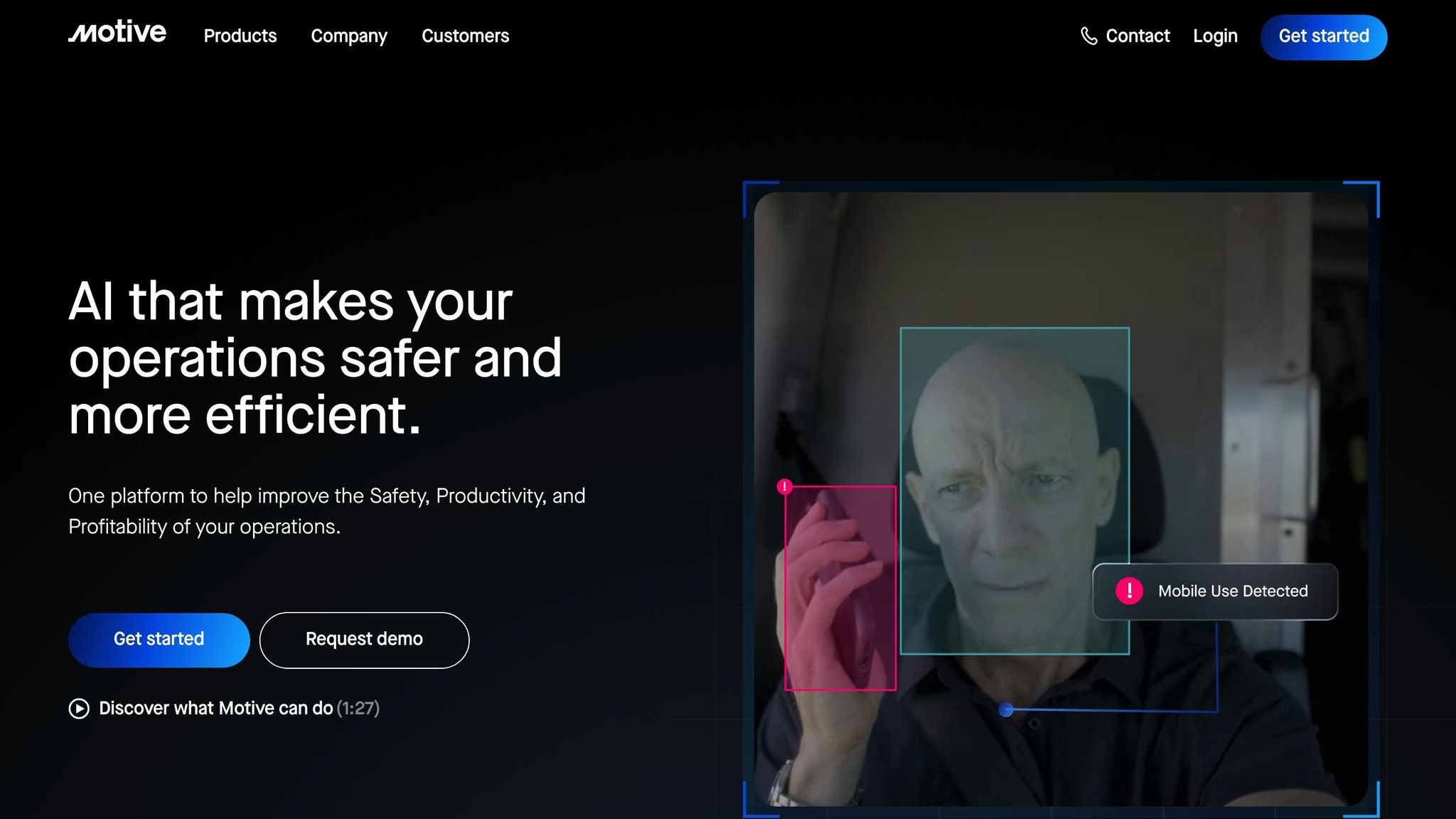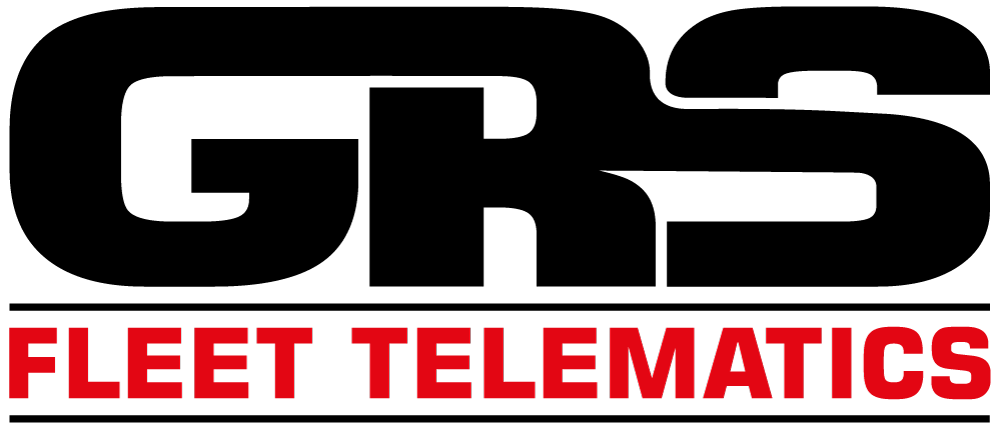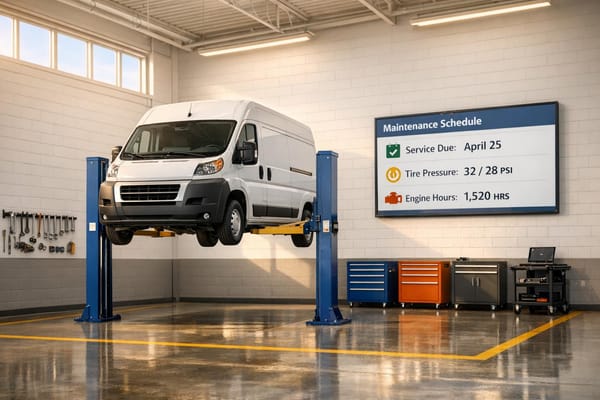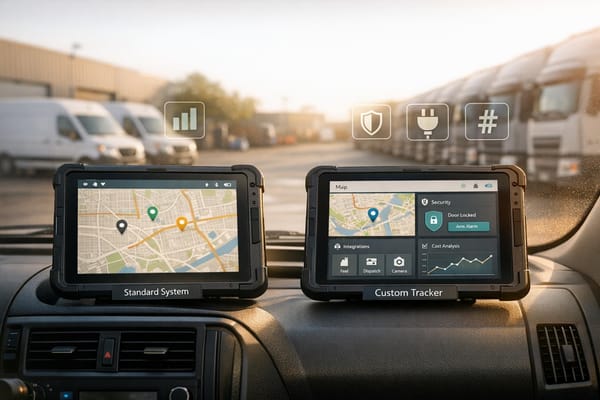Van Trackers for Rental and Leasing Companies
Explore how van trackers enhance security, reduce costs, and improve operations for rental and leasing companies in the UK.

Van trackers are GPS devices used to monitor and secure vehicles. Rental and leasing companies, which face risks like theft, misuse, and high insurance costs, can benefit significantly from these systems. Features like real-time tracking, geofencing, and remote immobilisation enhance security, improve fleet management, and reduce costs. Additionally, van trackers help meet UK regulations, lower insurance premiums, and optimise maintenance schedules. Starting at £7.99 per vehicle per month, they provide a cost-effective solution for protecting assets and improving operations. Below, we explore how these systems work, their benefits, and practical tips for choosing and installing the right tracker.
Main Benefits of Van Trackers for Rental and Leasing Fleets
Better Security and Theft Recovery
Van theft remains a significant problem for businesses across the UK, especially for rental and leasing companies. Losing a vehicle doesn't just mean the hassle of replacement - it also involves insurance claims, lost rental income, and potential damage to customer trust. For companies in this sector, the financial hit can be immediate and severe.
Modern van trackers offer a robust solution to this problem by providing multiple layers of security. Many advanced systems now feature dual-tracker technology. This combines a primary GPS tracker with a backup device, ensuring that even if thieves disable the main tracker, the vehicle's location can still be pinpointed.
With high-quality tracking systems, recovery rates for stolen vehicles can reach up to 91%. This not only increases the likelihood of recovering stolen vans but can also help lower insurance premiums, saving companies money in the long run.
Another valuable feature is remote immobilisation. This allows operators to disable a van's engine remotely, making it impossible for unauthorised users to continue driving the vehicle. Whether a van is taken without permission or a rental agreement is breached, this capability helps prevent further misuse and supports swift recovery.
For rental companies, these features bring added reassurance when handing over keys to customers. With better theft prevention and recovery measures, businesses can minimise the financial risks tied to each transaction.
Improved Operations and Cost Savings
Van trackers aren't just about security - they also play a key role in improving day-to-day operations and cutting expenses.
Real-time tracking provides companies with detailed insights into how their fleet is being used. From identifying idle vehicles to analysing customer routes and usage patterns, this data helps businesses optimise their fleet size. By maintaining just the right number of vehicles to meet demand, companies can avoid the costs of holding unnecessary inventory.
Tracking systems also monitor mileage and engine hours, enabling maintenance schedules to be based on actual usage rather than estimates. This approach reduces the chances of unexpected breakdowns and extends the lifespan of each vehicle.
Fuel management is another area where savings can be achieved. By monitoring fuel consumption, van trackers can highlight inefficiencies or potential issues, such as mechanical faults or unauthorised fuel use. For businesses managing fuel allowances, this data helps keep operating costs under control.
Additionally, the detailed records provided by GPS tracking can help resolve customer disputes. Whether it's about travel routes, mileage limits, or usage durations, having objective data makes it easier to address claims and avoid lengthy disagreements.
These operational improvements not only reduce costs but also ensure that fleets are managed more effectively and in line with industry regulations.
Meeting UK Regulations
Van trackers also play a critical role in helping businesses stay compliant with UK regulations.
Many insurance providers require companies to demonstrate that they have effective security measures in place. By equipping fleets with approved tracking systems, businesses can often secure lower premiums, thanks to reduced theft risks and higher recovery rates.
Precise mileage tracking is essential for leasing agreements and tax reporting. GPS systems provide tamper-proof data, ensuring accurate records for both tax purposes and vehicle valuations.
As the UK moves towards its net-zero targets, environmental reporting has become increasingly important. Van trackers can supply detailed information on fuel consumption and driving patterns, helping businesses monitor their carbon footprint and identify ways to reduce emissions.
Driver behaviour monitoring is another useful feature. By tracking habits like harsh braking, speeding, or rapid acceleration, companies can identify areas for training, reduce accident risks, and meet health and safety obligations.
Finally, the audit trails generated by tracking systems simplify compliance with regulations, cutting down on administrative work and allowing staff to focus on more critical tasks.
Motive Fleet View | Advanced GPS system for live and historical fleet tracking.

Important Features of Van Tracking Systems
When choosing van tracking systems for rental and leasing fleets, it's essential to look for features that go beyond basic tracking. The right tools can transform vehicle management into a streamlined and efficient process. Here are some standout features that modern systems offer.
Real-Time GPS Tracking and Monitoring
Real-time GPS tracking provides up-to-the-second updates on vehicle locations. This allows for quick responses to situations like breakdowns, theft, or the need to redeploy vehicles. With data refreshing almost instantly, fleet managers gain a clear, actionable view of their operations.
Additionally, historical route data is invaluable. It helps resolve mileage disputes, supports insurance claims, and aids in planning maintenance schedules. This not only helps cut costs but also enhances the overall security of rental and leasing fleets.
Driver Behaviour Monitoring and Geofencing
Tracking driver behaviour offers insights into driving patterns such as harsh braking, sudden acceleration, and speeding. Identifying these habits allows fleet managers to address inefficiencies and promote safer driving practices.
Geofencing adds another layer of control by creating virtual boundaries. If a vehicle crosses these boundaries, alerts are triggered automatically. This is useful for enforcing regional restrictions, monitoring out-of-hours usage, and flagging speed limit violations. Together, these features contribute to better security and operational savings.
Remote Immobilisation and Recovery Support
Remote immobilisation gives operators the ability to disable a van's engine, stopping unauthorised use in its tracks. Systems like those from GRS Fleet Telematics include dual-tracker technology, ensuring a backup tracker remains active even if the primary one is tampered with. Paired with 24/7 recovery support, these tools achieve recovery rates as high as 91%, offering a robust security solution for managing rental and leasing fleets effectively.
How Van Trackers Increase ROI for Rental and Leasing Companies
Van tracking systems play a key role in cutting costs and improving efficiency for rental and leasing businesses.
Cutting Costs with Theft Prevention
Vehicle theft can be a costly problem for rental and leasing companies. Modern tracking systems equipped with dual-tracker technology and remote immobilisation features make it easier to recover stolen vehicles quickly. This reduces the financial burden of replacing vehicles and minimises downtime. These advanced security features not only help curb theft-related expenses but also pave the way for additional operational savings.
Savings on Fuel and Maintenance
Monitoring driver behaviour can reveal issues like harsh acceleration or excessive idling. Addressing these behaviours through training can lead to better fuel efficiency and less wear and tear on vehicles. Additionally, route optimisation features help reduce unnecessary mileage, while predictive maintenance alerts tackle potential problems early, keeping fleet costs under control. These measures, combined with smarter fleet scheduling, significantly enhance cost savings and, in turn, the return on investment.
Improved Fleet Use and Customer Experience
Real-time tracking ensures vehicles are allocated where they’re needed most, leading to better scheduling, maximised asset usage, and happier customers.
With van tracking solutions starting at just £7.99 per vehicle per month, the benefits of theft prevention, reduced operational costs, and optimised fleet usage add up to a compelling return on investment. At GRS Fleet Telematics, our advanced tracking systems bring these advantages together, seamlessly integrating them into your fleet management approach.
Installing Van Trackers: Practical Considerations
Setting up van trackers is a smart move, but the choices you make today can shape your fleet's efficiency and security in the long run.
Choosing the Right Tracking System
Selecting the right tracking system comes down to understanding your fleet's needs and budget. GRS Fleet Telematics offers three distinct options:
- The Essential Tracker: Priced at £35 per unit, this option provides basic real-time tracking using a single wired device.
- The Enhanced System: At £79 per unit, this includes dual-tracker technology with a Bluetooth backup for added reliability.
- The Ultimate Security Package: For £99 per unit, you get dual-tracker technology along with remote immobilisation for maximum security.
For smaller fleets with 10–20 vehicles, the Essential tracker is often sufficient. However, larger operations with 100+ vans may find the Enhanced or Ultimate systems more suitable, thanks to their advanced features. Flexibility is another important factor - monthly software subscriptions start at £7.99 per vehicle, making it easy to scale up or down as your fleet grows or changes.
Once you've chosen a system, ensuring proper installation and integration is key to reaping the full benefits of your investment.
Installation and Integration
A successful setup is the foundation of better security, cost control, and return on investment. Professional installation is highly recommended to guarantee that the system works correctly from day one. Many providers even offer free installation alongside fleet branding, helping to minimise downtime and disruption.
Integration with your existing systems - such as booking platforms, maintenance trackers, and customer management tools - is equally important. Modern tracking solutions often include API connections, making data sharing straightforward. If you prefer to maintain your branding, white-label options are available, allowing you to present the tracking service as your own.
To keep your fleet operational during the setup process, consider staggering installations over time. A smooth integration process ensures that your tracking system delivers long-term value.
Support and Maintenance
Ongoing support is crucial to keep your tracking system running smoothly. With 24/7 customer support, issues like theft or system malfunctions can be addressed promptly. Many systems also offer proactive maintenance alerts, monitoring factors such as mileage, engine hours, battery health, and diagnostic trouble codes. Notifications are sent when maintenance is needed, helping you stay ahead of potential problems.
Recovery services add another layer of security, with dedicated teams assisting in vehicle recovery when necessary. Comprehensive technical support - available via phone or online - ensures that your team can resolve issues quickly and efficiently.
While there are ongoing costs, such as monthly subscriptions, SIM data, and hardware updates, these are often offset by savings from theft prevention and improved operational efficiency.
Conclusion: The Value of Van Trackers for Rental and Leasing Businesses
Van trackers play a crucial role for rental and leasing companies. By adopting advanced tracking systems, businesses can boost security, streamline operations, and improve profitability. Let’s recap the main advantages discussed earlier.
Key Points
Modern tracking features - like dual-tracker systems and remote immobilisation - offer a significant upgrade in both security and operational management.
The financial benefits are hard to ignore. Preventing theft reduces costs tied to vehicle replacement, insurance claims, and lost rental revenue.
Tracking driver behaviour not only encourages safer driving but can also cut down on accident-related expenses and potentially lower insurance premiums.
These systems are designed to integrate seamlessly with existing fleet management tools. Many solutions, starting at just £7.99 per vehicle per month, provide cost-effective options for fleets of all sizes, without compromising on functionality or customisation.
Next Steps for Rental and Leasing Companies
To protect your fleet and enhance efficiency, the next step is clear: evaluate and address your fleet’s vulnerabilities.
Start by identifying risks such as theft, inefficient routes, and maintenance issues. Compare these challenges with the cost of implementing a tracking system - most businesses see a return on investment within a year.
Select a tracking solution tailored to your fleet size and security requirements. Providers like GRS Fleet Telematics offer scalable systems that align with your business goals, ensuring you get the most out of your investment.
Opting for professional installation and 24/7 support ensures you maximise the benefits of your tracking system while enjoying added peace of mind and measurable results.
FAQs
How can van trackers help rental and leasing companies meet UK legal requirements?
Van trackers play a key role in helping rental and leasing companies meet UK legal standards, particularly when it comes to vehicle tracking and data protection laws. In the UK, businesses are permitted to track vehicles for legitimate reasons, but they must clearly inform drivers or customers about this and obtain their consent. This is in line with the requirements of the Data Protection Act and GDPR, which emphasise transparency in how data is gathered and used.
Following these regulations allows companies to use van trackers legally while maintaining the trust of their customers. Beyond compliance, van trackers offer practical benefits, such as tracking fleet activity and boosting operational efficiency, all while staying within the framework of UK law.
What are the costs and savings of using van trackers for fleet management?
The cost of adding van trackers to fleets across the UK generally falls between £7.50 and £30 per vehicle each month, depending on the system's features and complexity. While this might seem like a considerable investment, the potential savings can easily outweigh the expense.
For instance, businesses can cut fuel costs by up to 25%, which could mean saving as much as £286 per vehicle per month. On top of that, benefits like optimised routes, less wear and tear on vehicles, and improved security all contribute to a strong return on investment over time. By improving efficiency and reducing losses, van trackers offer rental and leasing companies both financial savings and smoother operations.
How do van trackers help improve driver behaviour and make fleets safer?
Van trackers are essential tools for promoting safer driving and improving fleet safety. By monitoring habits like speeding, harsh braking, and excessive idling, they provide fleet managers with real-time insights into driver behaviour. This data allows managers to spot risky patterns, offer tailored feedback, and introduce driver coaching to encourage safer practices on the road.
Another useful feature is the creation of driver scorecards and trend reports. These tools highlight areas where drivers can improve and reveal training opportunities. Encouraging better driving habits not only reduces the risk of accidents but also helps cut maintenance expenses and boosts fuel efficiency, offering long-term advantages for your fleet.




